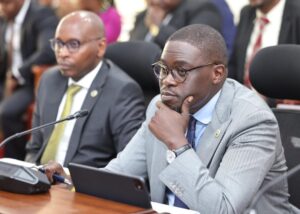Kenya Inches Closer to a Predictable Tax Refund as Finance Committee Commences Consideration os Proposed National Tax Policy

Kenya could be inching towards realizing a National Tax Policy, if the proposed draft policy is successfully processed and adopted by the National Assembly.
The move follows the commencement of the consideration of the proposed policy by the Departmental Committee on Finance and National Planning.
The draft policy which was tabled in the National Assembly in April this year, is set to herald the era of a predictable tax regime, a move that could encourage tax compliance, encourage foreign direct investment, and enhance accuracy in revenue projections.
Notably, if approved, this would be the first tax policy for the country after several unsuccessful attempts.
This morning, the Departmental Committee on Finance and National Planning commenced public participation on the policy. The Committee which is keen to spearhead this historic achievement, started off by engaging a number stakeholders to get their view points.
The Committee is scheduled to receive more views from a number of players in the finance sector, including the Kenya Revenue Authority before debate on the policy commences in the House.
Among those who appeared before the Committee today are the Institute for Certified Public Accountants of Kenya (ICPAK), Audit firm Deloitte East Africa, Institute of Economic Affairs and West Minister Consulting.
But even as public participation on the crucial policy kicks off ,the Committee has expressed concerns that the policy which emanated from the National Treasury, fails to address a number of cross-cutting issues such as those partaining double taxation, administration of tax exemptions and the manner in which the implementation of the proposed policy will be administered.
Speaking on the matter, Members led by the Committee Chairperson, Hon. Kimani Kuria encouraged the stakeholders to share their viewpoints frankly on these matters and related others, to help the committee generate a comprehensive document for consideration by the House.
“ We note that the proposed National Tax Policy has left out a number of cross-cutting issues that a policy of such nature must seek to address. We are for instance concerned that the proposed document has not covered issues to do with double taxation, exception of tax through conditional lending- which often results to massive exploitation of our people and minimal skills transfer, as well as mechanisms for determining excise duty rates”, Hon. Kimani noted.
Stakeholders who appeared before the Committee called for a structured change on the taxation system such that when investors especially, Foreign Direct Investors make a decision to invest in a particular sector, they can do so without fearing that the law could drastically change spelling doom on their investment.
They also called for a mechanism to determine excise duty rate to be provided for in the policy, with a rider that the rate be subjected to public participation.
They argued that without an arbitrary excise duty rate, the country would be able to determine its revenue projections accurately. The stakeholders further called for a clear criteria to be established under the policy, for tax exemptions to encourage transparency and accountability.
To enhance prompt remittance of refunds, the stakeholders proposed that a certain percentage of KRA collection be retained by the Authority for refunds, to address delays in processing of tax refunds leading to backlogs and cash flows challenges that have been attributed to delayed exchequer releases and approvals.
The proposed policy is set to provide policy guidelines to the country’s tax and tax administration reforms in the medium term.
It also articulates broad guidelines for governing tax administration and the tax system in Kenya
At the same time, Hon. Kimani has revealed plans of the Committee to conduct a post legislative analysis on the Finance Act 2023 before embarking on the consideration of next year’s Finance Bill.
He underscored the need for such an initiative to assess the impact of the various tax measures enacted on the economy. He further observed that this would help inform which tax measures are ideal for the growth of the economy.




